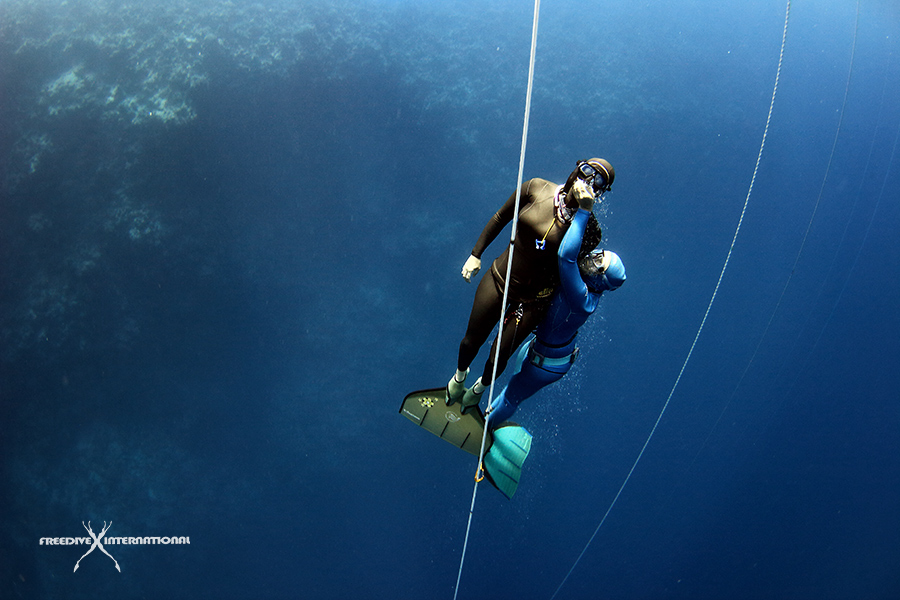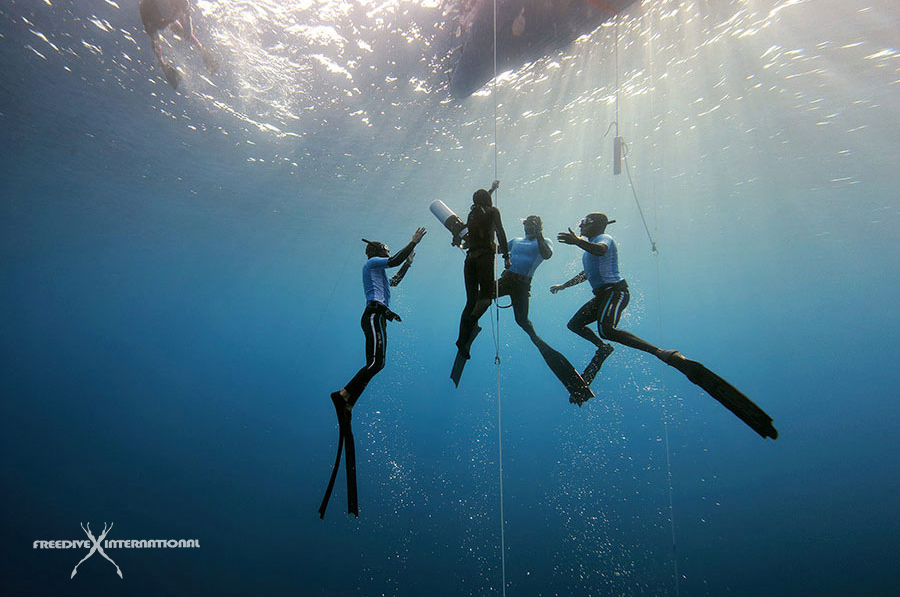How many times have you told your non-freediving friends, your mom or your girlfriend that freediving is a safe sport? That safety in freediving is our main concern, that we always have an emergency plan, that we know how to act when things get difficult and blah blah blah?
Do you want to know what I think about safety in freediving? I think we are getting lazy and sloppy. Since everything goes fine most of the time, the safety plan doesn’t need to be put in practice. This leads us to the wrong perception that is highly improbable to suffer an accident, or that they will only happen if your are reckless and stupid.
If you have been in a place with a big community of freedivers for a while, (Dahab i.e.) you can tell that we tend to overlook certain things and to overvalue our skills. You don’t believe me? Okay, then keep reading and tell me if you have seen any of these behaviors in your training spot during the last month.
Divers refusing to use lanyards
“I’m only warming up”, “There is no need of that here, there is no current and good visibility”, “I’m not a dog, I don’t need a leash”, “I want to feel free”. I’m sure you have heard these and other excuses to not use a lanyard.
If you are one of these divers who dislikes being tied to the rope and avoids using the lanyard whenever you have the chance, try to see the situation from the other side. Yes, this is not about you, this is about your buddy. How do you think he/she would feel if you just go down, suffer any unexpected issue and keep sinking to the bottom of the ocean? How do you think your friend will feel when he/she has to tell your spouse that you just disappeared at sea because he/she allowed you to dive without one of the most basic elements of safety in freediving?
If you suffer a blackout and the situation makes it impossible for your safety to rescue you, he/she will be able to bring you up, by pulling the rope. If you decide to not use a lanyard, you are taking from them this backup plan.
Do you want to deprive your safety from a way to help you if everything else goes wrong?
Safety divers with snorkeling fins (or without fins)
Yes, yes, I know what you are about to say. You are strong and in good shape. You can spend all day long diving down and up to 35 meters with those shitty toy fins. And do you wanna know what I think? I don’t care.
The fact that you can dive comfortably with short snorkeling fins doesn’t mean that you will be able to bring someone up who just suffered a deep black out. And even if you can do it, you will be doing a massive effort. Why do you want to put yourself in such a bad situation?
Don’t be selfish; don’t be disrespectful. Your dives as a safety are as important as your own deep dives. Would you go for a deep dive with those fins? Be ready to give your best if your buddy needs you.
How would you react if you arrive somewhere, ready to do your dive and your safety says they will do the task without fins because they are very strong divers and your depth is totally within their limits?
Safety divers who don’t go deep enough
This is often seen in people that have little experience. They are not sure about when their divers are coming up and they don’t start diving down until they can see him/her coming up.
Remember that, as a safety diver, you should always be feeling the rope during your buddy’s dive. This way, you will know when they are coming up. And, as a rule of thumb, you should meet them in the last ⅓ of the ascent.
If you don’t know how to provide safety or you don’t feel comfortable with the conditions, don’t agree to go diving with someone. Take a course where they teach you how to do this and practice it with a buddy until you feel confident.
Not checking if there is enough depth when doing the set up
Have you heard about someone hitting the bottom with the head because there was not enough depth? I heard a few. It can happen because the tide went down a little bit or because whoever did the line set up didn’t pay attention.
When you are dropping your line, let it go 2 or 3 meters deeper, to make sure there is enough space below your bottom weight. Then pull it up again and leave it in your depth. And if the session is long and the tide is big, check your line every few dives.

Not knowing/not being able to pull someone up
People don’t give enough importance to this, because blackouts usually happen in that area in which we are already positive buoyant. So, most of the time, bringing someone up is not a big problem, and only in very few cases, the unconscious diver needs to be pulled up.
But now. Imagine that, for whatever the reason, you are not able to bring your diver up. Maybe because you had a problem during the descent, or because some of the above circumstances also met.
Practicing to pull up a buddy can give you an idea on how it feels and make you aware of if it’s something you would be able to do.
Safety in freediving: is it enough with just one safety diver?
So, you are getting ready to do safety for your diver, you do your duck dive, you start the descent and, suddenly, one of your ears doesn’t equalize. You return to the surface and try again. What if your buddy blacks out during that dive?
It’s not something that happens often. But it could happen. And being prepared for it would avoid you problems.
I personally think that, in most cases, one diver providing a serious and good safety is more than enough. But if you are an advanced freediver and you are starting to go deep, maybe you should consider having always 2 safeties with you.
Even if a second safety is not needed, having a 3rd person in the buoy watching that everything is fine can be a great idea. If something unexpected happens, this person could be the one saving the day. They could do the safety dive if you had to go back to the surface due to equalization problems. Or they could dive and give a hand if they see something strange happening during the last meters of the ascent. The same if something happens in the surface.

Now, you can go out and keep doing the same you have been doing until now.
And, whenever something happens you can blame on how ignorant or reckless was the person who suffered the accident. And keep repeating that boring speech of “freediving is safe, in all the history of competitions there was only one time when….”
Or you can start taking things a bit more serious. You will avoid putting yourself and your team in a bad situation. And you will be giving a good example to all the less experienced freedivers who see you in the water. What is the worst that can happen if you are too strict in terms of safety in freediving?
One friend of mine, with a broad experience as a safety diver, both in private sessions and in competition, told me once, that when he is working as a safety he always dives expecting the diver to have a bad deep black out. He is ready to do his best. And, if the dive ends up in a successful way, he looks at it as a wonderful surprise. It’s better to be surprised when everything went perfect and you were not needed that in the opposite case.
Safety in freediving is for the moment when things go wrong. And in that moment all of us want the best of the best. Don’t be lazy, don’t be cheap, because you have someone’s life in your hands. What do you wanna do with it?
If you want to avoid these problems and have a reliable safety with a reliable plan, you can always book your training sessions with a freediving center, instead of going in the water with random people that you have just met. If you are planning to go to Egypt, we will be happy to help you with your training in Freedive Dahab. Drop us a message!







